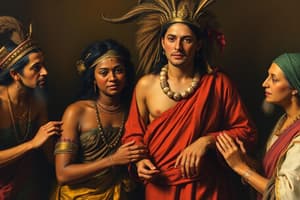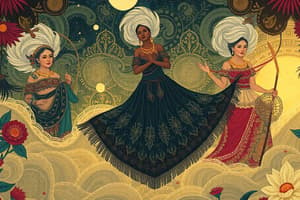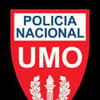Podcast
Questions and Answers
What roles did the traditional African king perform within the society?
What roles did the traditional African king perform within the society?
- Religious, military, and social roles
- Executive, legislative, and judicial functions (correct)
- Economic, administrative, and mediatory roles
- Cultural, educational, and agricultural roles
Which institution played an advisory role during the installation of a king in both Benin and Oyo?
Which institution played an advisory role during the installation of a king in both Benin and Oyo?
- The Uzama and Oyomesi councils (correct)
- The council of Elders
- The secret cults
- The village heads
What was a common consequence of a king's failure to respect tradition?
What was a common consequence of a king's failure to respect tradition?
- Massive protests and dethronement (correct)
- Reinforcement of royal authority
- Formation of new councils
- Increased economic prosperity
How was authority structured in the centralised political systems in traditional African societies?
How was authority structured in the centralised political systems in traditional African societies?
What facilitated the abuse of power in traditional African political systems?
What facilitated the abuse of power in traditional African political systems?
What served as institutional checks and balances in traditional African societies?
What served as institutional checks and balances in traditional African societies?
What was the role of age-grades and members of secret cults in traditional African communities?
What was the role of age-grades and members of secret cults in traditional African communities?
What aspect of the king's role was crucial for maintaining harmony within the community?
What aspect of the king's role was crucial for maintaining harmony within the community?
What has largely replaced the conflict resolution model established during colonial times in Africa?
What has largely replaced the conflict resolution model established during colonial times in Africa?
Which of the following issues is NOT mentioned as a problem facing African leaders today?
Which of the following issues is NOT mentioned as a problem facing African leaders today?
What is a characteristic of traditional African governance compared to modern governance?
What is a characteristic of traditional African governance compared to modern governance?
What type of regime is characterized by a lack of a political party system?
What type of regime is characterized by a lack of a political party system?
Which of the following African countries is NOT mentioned as having experienced military regimes?
Which of the following African countries is NOT mentioned as having experienced military regimes?
Which statement best describes the impact of colonialism on political culture in Africa?
Which statement best describes the impact of colonialism on political culture in Africa?
What has been a consistent challenge for African political leaders since independence?
What has been a consistent challenge for African political leaders since independence?
Which of the following statements is true regarding the political systems in Africa?
Which of the following statements is true regarding the political systems in Africa?
What is the foundational aspect of political organizations in many African societies?
What is the foundational aspect of political organizations in many African societies?
Which eponymous ancestor is recognized as the first king of Ife among the Yoruba?
Which eponymous ancestor is recognized as the first king of Ife among the Yoruba?
What role do myths play in African political culture?
What role do myths play in African political culture?
In the context of the Tallensi of Northern Ghana, who are referred to as their ancestors?
In the context of the Tallensi of Northern Ghana, who are referred to as their ancestors?
Which legend is considered the most important single source for Hausa history?
Which legend is considered the most important single source for Hausa history?
What is the perceived relationship between society and the supernatural in African political thought?
What is the perceived relationship between society and the supernatural in African political thought?
Among the Nyoro of Bunyoro, who is credited for creating the earth and the first family?
Among the Nyoro of Bunyoro, who is credited for creating the earth and the first family?
Which of the following assertions correctly describes the family system's role in African political organizations?
Which of the following assertions correctly describes the family system's role in African political organizations?
Which political system is characterized by a one-party state in several African nations?
Which political system is characterized by a one-party state in several African nations?
What type of political system is identified with Senegal, Nigeria's Second Republic, and Ghana's Third Republic?
What type of political system is identified with Senegal, Nigeria's Second Republic, and Ghana's Third Republic?
Which of the following ideologies is NOT mentioned as a legitimating paradigm by African leaders?
Which of the following ideologies is NOT mentioned as a legitimating paradigm by African leaders?
What common characteristic is noted in the communication between rulers and the people in traditional African political systems?
What common characteristic is noted in the communication between rulers and the people in traditional African political systems?
What is a challenge faced by African leaders regarding governance?
What is a challenge faced by African leaders regarding governance?
What outcome has often been produced by the ideological formulations of African leaders?
What outcome has often been produced by the ideological formulations of African leaders?
What effect has the mystification of political authority had in African governance systems?
What effect has the mystification of political authority had in African governance systems?
What does the content suggest about the fusion of traditional political ideals and the presidential system in Africa?
What does the content suggest about the fusion of traditional political ideals and the presidential system in Africa?
What distinguishes prehistory from history?
What distinguishes prehistory from history?
Which of the following materials primarily contributes to our understanding of prehistoric human existence?
Which of the following materials primarily contributes to our understanding of prehistoric human existence?
What is one of the significant discoveries made by early humans during the prehistoric period?
What is one of the significant discoveries made by early humans during the prehistoric period?
Which evidence suggests the religious life of early humans?
Which evidence suggests the religious life of early humans?
Which aspect was NOT significantly affected by earlier human discoveries during prehistory?
Which aspect was NOT significantly affected by earlier human discoveries during prehistory?
What type of evidence includes remains like bones of early humans?
What type of evidence includes remains like bones of early humans?
Which category does NOT typically represent the remains left by early humans?
Which category does NOT typically represent the remains left by early humans?
What period does the term 'historical' cover?
What period does the term 'historical' cover?
Study Notes
Indigenous African Political System
- Indigenous political organizations predate Western systems and are rooted in African culture.
- African political institutions are often linked to supernatural elements found in origin myths.
- Kinship and lineage play important roles in traditional African political systems, with founding myths providing legitimacy.
- Among the Yoruba, Oduduwa is regarded as the first king of Ife, symbolizing the origins of Yoruba society.
- The Bayajidda legend is a significant source of Hausa history in Hausaland.
- Unkulunku, the High God in Zulu culture, created chiefs for maintaining social stability.
- The Nyoro of the Bunyoro-Kitara Kingdom believe Ruhanga, a deity, created the first family and the earth, emphasizing the family's role in governance.
- Political culture in African societies often centers on family systems, which affect leadership trust and law implementation.
- Tallensi trace their origins to ancestral figures known as "tendana," while the Nupe refer to Tsoede's supernatural influence.
- Myths are prevalent across Africa, framing political culture as deeply interwoven with supernatural beliefs.
- African kings acted as religious leaders, performing rituals and sacrifices to ancestral spirits for societal welfare.
- Traditional kings in Africa held executive, legislative, and judicial powers, centralizing authority in a hierarchical order.
- Centralized political systems often concentrated power in a few rulers, leading to power abuses.
- Institutional checks, like consultation councils, provided mechanisms to control abuses of power, seen in the Benin and Oyo kingdoms.
- Traditional governance structures faced challenges during the colonial period, leading to a clash between old and new systems of governance.
- Many African countries today practice presidential systems, with variations: rationalized, parliamentary, and partisan regimes.
- Rationalized regimes often lack political party systems, while parliamentary systems merge with presidential frameworks.
- Partisan regimes uphold multi-party systems, found in countries like Senegal and Nigeria.
- Leaders struggle to integrate traditional governance with modern political systems, leading to a paradox in political authority.
- Traditional governance often lacked electoral components, making adaptation to modern systems complex.
- Development of political thought in modern Africa involves tensions between traditionalism and contemporary democracies.
- The African concept of governance includes two-way communication, illustrated by village square meetings, which can be combined with modern systems.
- Traditional values, when articulated properly, could enhance the efficacy of modern governance in Africa.
Studying That Suits You
Use AI to generate personalized quizzes and flashcards to suit your learning preferences.
Related Documents
Description
Explore the traditional political organizations established by African indigenous peoples prior to Western influence. This quiz delves into how kinship and supernatural beliefs shaped these systems, highlighting their historical significance and unique characteristics.





